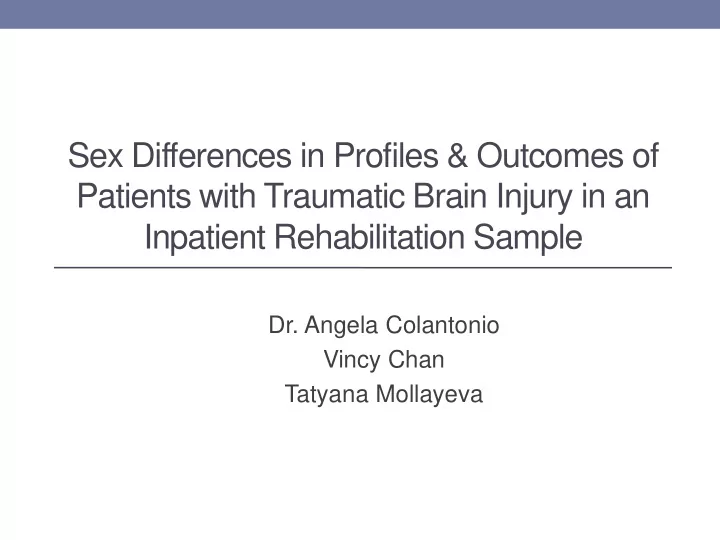

Sex Differences in Profiles & Outcomes of Patients with Traumatic Brain Injury in an Inpatient Rehabilitation Sample Dr. Angela Colantonio Vincy Chan Tatyana Mollayeva
Background & Significance Traumatic brain injury (TBI): • Damage to the brain after birth by traumatic events • Leading cause of death & disability worldwide • Cost of TBI is considerable, indirect costs expected to increase significantly
Background & Significance Sex differences in TBI population outcomes: • Women more likely than men to be discharged to care facilities • Association between TBI & depression, substance use, anxiety • Comorbidities influence discharge destination
Background & Significance However • Paucity of research on TBI outcomes that consider sex differences • Scarce population based information on the range of health conditions that affect patients with TBI in inpatient rehabilitation
Specific Aims • Examine sex differences in profiles and outcomes of patients with TBI in a population based province wide rehabilitation sample • Explore the range of medical comorbidities in this population
Methods Sample: • All patients in inpatient rehabilitation with a TBI diagnostic code between fiscal year 2004/05 and 2007/08 • Only the first inpatient rehabilitation admission for each patient was considered Data Sources: • National Rehabilitation Reporting System (NRS) • Mandatory reporting in Ontario = population based
National Rehabilitation Reporting System • Clinical outcomes, characteristics of rehabilitation activities • Data from every inpatient rehabilitation bed within acute care or free standing rehab hospitals in Ontario, Canada • Cases grouped by Rehabilitation Client Groupings (RCG) • Inclusion in study: RCG 2.2, 2.21, 2.22 (TBI)
Methods Key variables: • Demographic: • Age, sex, language, geographic location of residence • Clinical: • Comorbid health conditions • Length of stay • Total function score, cognitive and motor rating from the FIM™ Instrument
Results by Age and Sex (N=1,791) 90% 80% 70% 60% 50% Males 40% Females 30% 20% 10% 0% <65 Years (n=1,164) 65+ Years (n=627) Age Groups
Average Length of Stay 60 50 40 Days 30 Males Females 20 10 0 <65 Years 65+ Years Age Groups
FIM™ Scores & Ratings: Admission 90 Male Female Average FIM™ Score & Ratings 80 70 60 50 40 30 20 10 0 Total Function Score Motor Rating Cognitive Rating
FIM™ Scores & Ratings: Discharge 120 Male Female Average FIM™ Score & Rating 100 80 60 40 20 0 Total Function Score Motor Rating Cognitive Rating
1+ Comorbid Health Conditions: Admission 100% 95% 90% 85% Males Females 80% 75% 70% <65 Years 65+ Years Age Groups
1+ Comorbid Health Conditions: Discharge 30% 25% 20% Males 15% Females 10% 5% 0% <65 Years 65+ Years
Summary • More females had at least one comorbid health condition at admission and at discharge • Types of comorbid health conditions differed by sex and age groups
Limitations • Extensive validation not done on all variables • Not all desired variables available • Sample limited to patients coded as having a TBI in the NRS
Implications Important to understand the influence of comorbidities on rehabilitation outcomes by sex: • Awareness of comorbidities can help treat and incorporate them into the rehabilitation program and to prevent missed/delayed diagnoses • Inpatient rehabilitation may present an opportunity to prevent re-injury
Implications Understanding the interface between comorbid conditions and TBI by sex and age can: • Inform planning of rehabilitation services • Prepare community support and services for the TBI population after inpatient rehabilitation
Acknowledgements Disclosure: This study was supported in part by the National Institutes of Health – National Center for Medical Rehabilitation Research (NICHD), National Institute on Neurological Disorders and Stroke, and National Institute on Aging (Grant #R24HD065702) Support for Dr. Colantonio : Saunderson Family Chair, Toronto Rehabilitation Institute, Canadian Institutes for Health Research (CIHR) Chair in Gender, Work and Health (#CGW-126580) Support for Vincy Chan : CIHR, Ontario Neurotrauma Foundation, Brain Canada, Pediatric Oncology Group of Ontario, CIBC Support for Tatyana Mollayeva : CIHR
THANK YOU! MERCI! For more information: www.abiresearch.utoronto.ca Vincy Chan: vincy.chan@uhn.ca
Recommend
More recommend